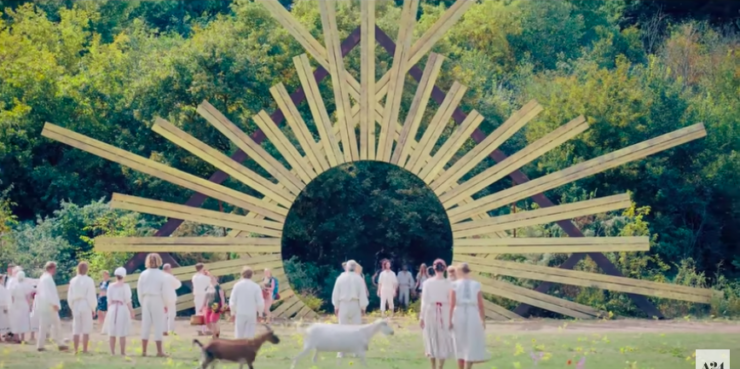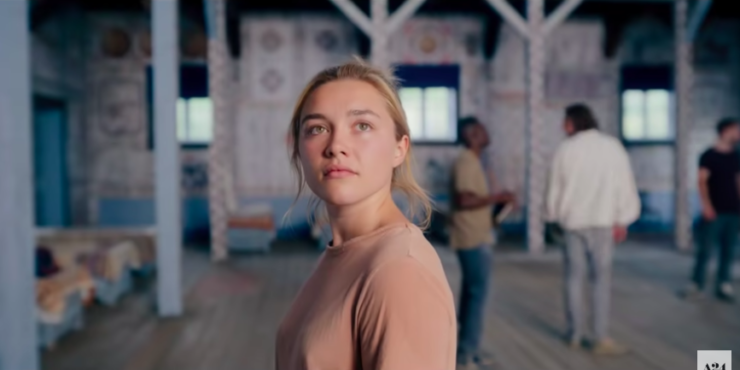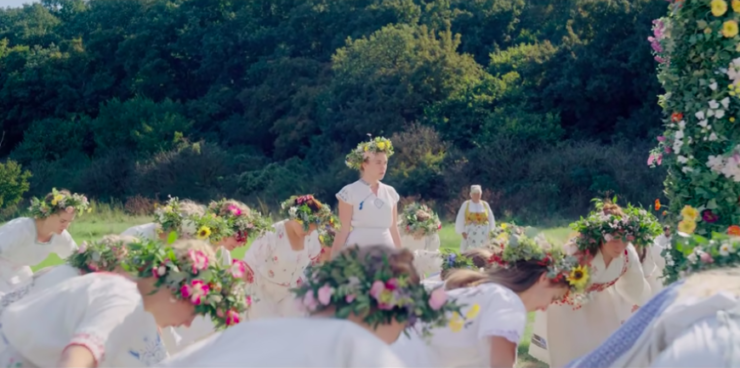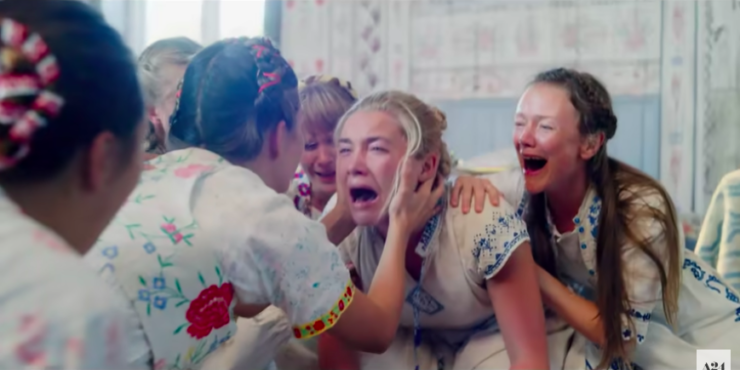To everything (turn, turn, turn) / There is a season (turn, turn, turn), The Byrds sang. If you listen closely, Ari Aster’s new horror film Midsommar says, you will hear the laughter behind a wrenching sob. No matter how awful it feels in the moment, you will wake up the next morning, and the next, and the next. Even the longest winter will always give way to spring. Whereas Hereditary, the writer/director’s debut feature, is about the sacrificial lamb meeting its preordained end, Midsommar concerns itself with the entire life cycle.
Which, yes, still includes death. Lots and lots and lots of death.
While this is a non-spoiler review, the comments will be fair game for spoilers, because there is a lot to talk about.
How do you top Hereditary, with its eerie dollhouses and severed heads and Toni Collette’s incredibly raw performance? How, really, does any horror filmmaker succeed in scaring audiences a second time without them knowing what’s coming? The key is in finding an entirely different angle: Aster went for the polar opposite of Hereditary’s dark rooms and bleak curse, setting Midsommar at a fictional commune during Sweden’s midnight sun. Because just as scary as dark corners in which you glimpse the whites of eyes or smiling teeth, is a bright, sun-drenched village with no corners in which to hide, in which all of the danger is laid out right before your eyes.
While Midsommar is just as disturbing as Hereditary—perhaps even moreso at times, considering its most nightmarish moments all take place during the day—it’s nowhere near as surprising. Tapestries and linens and wallpaper, from a title card to the communal sleeping quarters, lay out most of the plot, if you can speed-“read” the images fast enough. On the one hand, kudos to Aster for fulfilling every promise he makes in that art, often in too-gruesome ways; on the other, it’s a tad disappointing to be able to guess at the arc of the narrative.

The Hårga village is the summer destination for four American grad students: anthropologist Josh (The Good Place’s William Jackson Harper), writing his thesis on European communes such as this; asshole Mark (Will Poulter), the quintessential outsider who has no regard for any tradition; aimless Christian (Jack Reynor); and his girlfriend, Dani (Florence Pugh). Dani is treated like a hanger-on by this group of guys, despite the fact that she is the audience proxy and the heart of the movie. During the wintry prologue, Christian is trying to compel himself to break things off with Dani, their relationship having long since run its course. But when she suffers an unimaginable family tragedy, he feels has no choice but to remain in her life, lest she feel that she has lost everything.
And so he awkwardly invites her along on this trip with their smiley friend Pelle (Vilhelm Blomgren) to see the village of his childhood, and the special celebration that occurs only every 90 years. Despite how welcoming the Hårga people are, with their mushroom tea and lingering embraces, the commune is undeniably creepy: punctuating rituals with strange, sharp gasps; storybook buildings that are forbidden to enter; a deformed adolescent lurking on the fringes. Dani immediately cottons on to something being off in this idyllic hamlet, but in typical horror fashion, no one believes her.
Pugh’s is the breakthrough performance here. While most female characters in horror are fully-formed archetypes—virgin, slut, mother, crone—Dani is so clearly in the middle of growth, mired in self-destructive patterns, unable to see the proverbial forest for the trees. Dani is depressed, suffering from the anxiety of her worst fears being confirmed and still being unable to stop the tragedy; she can hardly get out of bed. She dresses in shapeless T-shirts and baggy sweatpants, not the crop tops and cutoffs one might expect of a female character on a sunny Eurotrip. Mark disdains her lack of interest in sex on Christian’s behalf, brusquely failing to consider that maybe sex is rock bottom on her priorities list. She is consistently misunderstood and underestimated, both by the men in her life and by herself.

Throughout the film, Dani’s instincts are never wrong, but she is so wracked by anxiety and trauma that more often than not she apologizes or talks herself out of it. Scenes in which she battles panic attacks that seemingly come out of nowhere—and supposedly have no place in this happy midsummer celebration—by whispering, “Stop it, stop it!” to herself are so wrenching because the audience is watching the heroine dismantle herself and her agency.
Despite Christian’s martyrdom about staying in the relationship for Dani’s sake, he’s not nearly the paragon of support that he makes himself out to be. When she tries to confront him about keeping the trip from her, he turns it around on her, to the point that she apologizes for misunderstanding and begs him to stay with her. And when events begin to occur that are clearly triggering for Dani, he is so emotionally uninvested that he can barely be bothered to offer up halfhearted comfort.

Similar to how Hereditary presents a family that cannot talk to one another, Midsommar is in part about the ineffectuality of comforting grief. “Does he make you feel held?” Pelle intently asks Dani after one such failure of communication. Because the Hårga will hold their family, will mirror their joy and their despair with equal fervor. This heightened atmosphere of extreme love and support only makes clearer how Dani and Christian have let their toxic relationship wither on the vine—and how it’s starting to poison Christian’s male friendships.
After all, this is a breakup movie. It’s also a dark comedy, which comes through the most in the exchanges among the Americans. Aster has an ear for naturalistic dialogue, really playing up these interlopers’ blank expressions and snarky asides when confronted with customs not their own—and even when the festivities abruptly turn grisly a few days in. Despite all the slow-creeping unease, the shift to the gory is jarring enough to be funny. There is something comical about a cult member hefting a giant mallet with a sunny smile; and by the time we get to the requisite room of middle-aged naked people—which seems to be an Aster affect, as we’re currently two for two—it’s as funny as it is horrifying.

That said, it takes a long time to get there. Midsommar clocks in at two and a half hours, yet at times it felt as long as the nine-day celebration it depicts. Part of this is embedding the Americans, and the audience, fully into the Hårga community before shit gets real, but stretching the time also gives the audience enough of a chance to guess at what scares will come next. And despite the long run-time there are still plot threads that feel unresolved. In particular, there’s a fascinating subplot about Josh, who as the archetypal genre-savvy guy (and an anthropologist) understands the most of everyone. Consistently a step or two ahead of his friends—and for some reason not warning them of the horrors to come—he watches the action unfold as well as observing their reactions to said events. I would have loved to see more fallout from his decision to treat his friends as subjects as much as he does the Hårga.
With Hereditary, Aster was working with a tight family unit; here, the cast is as sprawling as the village, even the villagers who serve only one role. That contributes to the feeling of drifting through parts of the movie, but rest assured there will be a horrific ritual to snap your attention back, or an inappropriately hilarious moment. And if you stick with Dani, if you trust her more than she trusts herself, you will be rewarded with a unique take on the Final Girl archetype, one who might even be able to transcend the horror movie and live on in another story. Turn, turn, turn.
Natalie Zutter is a big fan of horror that makes her laugh. Talk Midsommar and other disturbingly bright horror films with her on Twitter!










